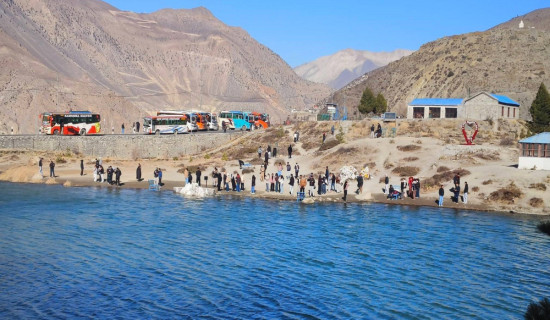- Wednesday, 21 January 2026
Boost Capacity Of Judicial Committees
Access to justice is one of the key challenges facing Nepal's judicial system. The low level of awareness, legal literacy and inherent social and structural system has posed obstructions for a large section of the society – particularly, women and members of disadvantaged communities – from accessing justice. For decades, the formal justice system included the Supreme Court at the top, and appellate and district courts at the middle and lower rungs. But the bureaucratic and formal nature of the structure discourages many people from approaching the justice system. As a result, they suffer injustice in silence.
In order to overcome these impediments, the state did introduce the system of community mediation and justice administration through quasi-judicial bodies. But they were neither formally institutionalised nor the general people made aware of their services. The Constitution of Nepal 2015 provided for separate judicial committees under the local level – to work as primary vehicles for community-based justice-dispensation system to address this concern.
Existing system
Article 217 (1) of constitution provides for the three-member judicial committee in each of the 753 local levels with the mandate to adjudicate, arbitrate and refer cases for mediation at the local level based on their jurisdiction. Article 217 (2) provides for the election of the other two members of the judicial committees from within the village and municipal assemblies. The judicial committees, as provided for by the statute, are headed by deputy mayors in the case of municipalities and by vice chairperson in the case of rural municipalities.
The Local Government Operation Act (LGOA) 2017 has further elaborated the functional and procedural aspects of the judicial committees. Clause 47 (1) of the LGOA, states that the judicial committees have been empowered to settle disputes related to 13 specific matters. There have been two rounds of elections in the local level since the promulgation of the constitution. But judicial committees have been facing multi-pronged challenges, including a lack of institutional mechanism, insufficient clarity on jurisdictions, a lack of procedural clarity, expertise and human resources, administrative capacity and the implementation capacity, etc.
Nepal Law Society (NLS) and Rural Development Foundation (RDF) have been working at the forefront in organising programmes to support the functioning of judicial committees since the promulgation of the national charter – such as support for drafting the LGOA by the Ministry of Federal Affairs and General Administration, conducting pilot study of the performance of judicial committees, conducting training for judicial committee functionaries on due process, facilitation between committees and concerned district courts, capacity building through orientations, facilitating the network for the committees and compiling concerns from all the local level leaders regarding the necessary policy/legal reforms. In fact, the NLS is one of the very few civil society organisations that has regularly worked to empower judicial committees and advocate for necessary reforms to make them effective.
Accessing justice sector services and legal aid is particularly challenging for local communities in the Madhes and Lumbini provinces due to structural barriers. The population of both provinces predominantly consists of marginalised communities such as the Madhesi, Muslim, and Tharu. The inherent gender biases have also obstructed the functional freedom for the women coordinators in these provinces. It is especially difficult for marginalised groups to enjoy the full benefits of the justice system due to historic and institutionalised systems of discrimination that restrict them from having the knowledge and tools necessary to navigate convoluted justice mechanisms.
The Human Development Indices (HDIs) of both provinces indicate that the areas are lagging behind other parts of the country in terms of social development. Madhes Province ranks last among all seven provinces in terms of HDI while Lumbini Province ranks fourth. These low HDI rankings highlight discrepancies within the life expectancy, education, and standard of living of communities in the provinces. Lacking in social development creates extra barriers to access for marginalised communities.
Mediated settlement
Despite these challenges, in the last seven years the judicial committees have shown how they can be effective and essential in ensuring access to justice, particularly for women and members of disadvantaged communities at grassroots level – who tend to shy away from formal court system but would take the advantage of judicial committees that function in their neighbourhood. Some of their contributions include the creation of environment where the local people could approach the judicial committees in their neighbourhood for justice, being economical and accessible compared to formal court system, helping in reducing the burden on court system; mediated settlement of long pending cases; and increased awareness on justice system at local level.
In order to further empower the judicial committees, there has to be focused support in particularly two areas: First, support for the development of their institutional and structural capacity involving both capacity building as well as facilitation with the formal justice system for ensuring better judicial access to women, youths and marginalised groups. Second, intervention should be designed in order to make the support sustainable – through the development of local civil society organisations that can help the targeted communities come forward to seek justice and in order to promote accountability of the judicial committees as well as the local level authority.
In order to bring these interventions, firstly there needs to be a functional manual for the judicial committees prepared by the federal government in coordination with different national and international agencies. These interventions can result in the sustained empowerment of the judicial committees, leading to the institutionalised access to justice for those who need it the most.
(Pradhan is Executive Director of Nepal Law Society.)
















